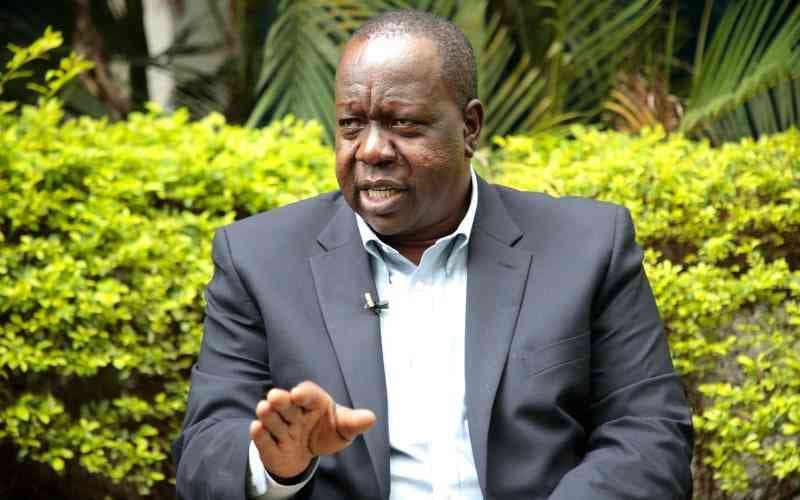We're loading the full news article for you. This includes the article content, images, author information, and related articles.
Former Interior Cabinet Secretary Fred Matiang'i defends his controversial tenure, asserting his actions were lawful enforcement, not brutality. The statement revives debate on his legacy, marked by media shutdowns and defiance of court orders.

NAIROBI – Dr. Fred Matiang'i, the former powerful Interior Cabinet Secretary, on Wednesday, October 29, 2025, dismissed long-standing allegations that he operated as a dictator, stating his actions were strictly within the confines of Kenyan law. Speaking during an interview on Spice FM in Nairobi, the 2027 presidential aspirant argued that his reputation for having an “iron fist” was a misinterpretation of his commitment to discipline in a system accustomed to corruption. “Dictatorship is where you force your way in an environment where there is a systemic and structured framework of doing things,” Dr. Matiang'i stated. “There is nothing that happened in that department or any department that I worked in that was outside the established regulations and systems.” He contended that he did not create new laws but simply enforced existing ones, a practice he claimed was perceived as authoritarian only because of a prior culture of impunity.
Dr. Matiang'i's tenure under former President Uhuru Kenyatta, particularly as Interior CS from 2017 to 2022, was one of the most contentious in recent Kenyan history. His elevation to chairperson of the National Development Implementation and Communication Cabinet Committee in January 2019 effectively made him a 'super CS,' coordinating all government ministries and projects—a move that consolidated his power significantly. However, it was his ministry's direct actions during moments of political crisis that cemented his divisive public image.
A defining moment of his leadership occurred on January 30, 2018, when the government, under his direction as Interior CS, shut down the country's three largest independent television stations: NTV, Citizen TV, and KTN News. The shutdown was a direct response to the stations' live broadcast of opposition leader Raila Odinga's symbolic “swearing-in” ceremony at Uhuru Park. Dr. Matiang'i defended the move as a necessary national security measure, accusing the media houses of participating in a “well-choreographed attempt to subvert or overthrow” the government. The shutdown persisted for days, even after the High Court of Kenya issued an order on February 1, 2018, for the government to restore the broadcasts pending a hearing. The government's defiance of a court order was widely condemned by media and civil society as a grave assault on media freedom.
Further accusations of authoritarianism stemmed from the protracted saga involving lawyer and opposition activist Miguna Miguna. In February 2018, following his role in Mr. Odinga's ceremony, Dr. Miguna was arrested and forcibly deported to Canada. This action was taken despite the High Court issuing multiple orders for his release and production in court. When Dr. Miguna attempted to return in March 2018, he was denied entry and detained for several days at Jomo Kenyatta International Airport before being deported again, in open defiance of further judicial rulings. The High Court subsequently found Dr. Matiang'i and other senior security officials guilty of contempt of court, though this conviction was later set aside by the Court of Appeal on procedural grounds in September 2025. In his recent interview, Dr. Matiang'i defended the deportation, claiming Dr. Miguna refused to complete a simple form to regularize his citizenship, which he argued was a legal requirement based on a prior court ruling.
Throughout Dr. Matiang'i's term, human rights organizations consistently raised alarms over the conduct of security forces. Human Rights Watch documented numerous cases of police brutality and extrajudicial killings, particularly in the context of the 2017 post-election protests. The Independent Policing Oversight Authority (IPOA) has struggled to secure convictions, a situation critics attribute to a lack of political will to hold security forces accountable. The Law Society of Kenya (LSK) frequently issued statements condemning the executive's disregard for court orders, a recurring theme during this period. These events created a persistent tension between the executive, led by powerful figures like Dr. Matiang'i, and the judiciary, which often found its authority challenged. Critics argue that the justification of 'national security' was often used to bypass constitutional and legal checks on executive power. While Dr. Matiang'i now frames his legacy as one of lawful discipline, his record remains a focal point for the ongoing debate in Kenya over the balance between state authority and the fundamental rights of citizens.
Keep the conversation in one place—threads here stay linked to the story and in the forums.
Other hot threads
E-sports and Gaming Community in Kenya
Active 8 months ago
The Role of Technology in Modern Agriculture (AgriTech)
Active 8 months ago
Popular Recreational Activities Across Counties
Active 8 months ago
Investing in Youth Sports Development Programs
Active 8 months ago
Key figures and persons of interest featured in this article